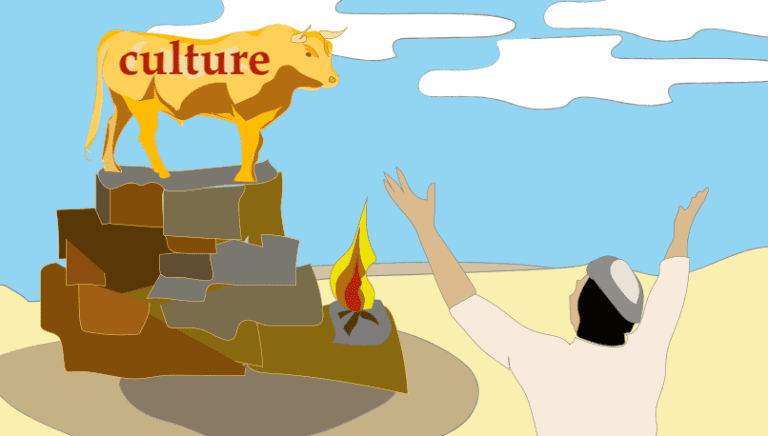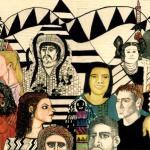Americans now treat culture as a sacred creed. This sacralization of culture in American society has led to a notable shift in the social dynamics of the country (as I shared in my previous post). As cultural identity ascends to a place of sacrosanct significance, it fosters a robust in-group loyalty that is double-edged.
When We Idolize Cultural Identity
On one edge, this loyalty enhances the understanding and appreciation of one’s heritage, leading to a vibrant mosaic of community life and personal identity. Individuals within these cultural enclaves can experience a profound sense of belonging and solidarity, often resulting in strong support networks and a resilient sense of self.

However, the other edge of this loyalty can be sharp and divisive. The intense focus on cultural identity can lead to siloing, a phenomenon where individuals become insular within their cultural groups, engaging less with those outside their immediate cultural sphere.
This insularity may not be intentional, but the outcome is the same: a societal fragmentation where the common ground—once the hallmark of the American experiment—is slowly eroded. Cultural absolutism (the idea that one’s cultural practices and beliefs are the supreme guide for life) can take root, leaving little room for the mutual exchange of ideas and traditions.
One can never compromise one’s most sacred creed.
This dynamic is not just theoretical; it manifests in neighborhoods, schools, workplaces, and places of worship. Communities may self-segregate, not just in terms of physical space but in the realm of ideas and shared experiences. The rich potential for cross-cultural interaction and learning is diminished when cultural identities are held as infallible.
Challenges to Dialogue and Integration
Treating culture as sacred poses significant challenges to dialogue and integration, especially in a pluralistic society like the United States. When cultural norms and values are positioned beyond the realm of questioning, it effectively stifles open dialogue and the exchange of ideas. This hindrance is problematic because it impedes the kind of constructive criticism and robust debate that leads to societal growth and understanding.
In a country where diverse cultures have historically come together to form a more unified whole, the inability to critique or discuss aspects of cultural identity can create barriers to understanding. When individuals from different cultural backgrounds meet, the unwillingness to engage in dialogue about cultural differences can lead to misunderstandings and missed opportunities for cooperation.
Instead of a melting pot or a mosaic, society risks becoming a series of monoliths, impressive yet isolated.
The Role of Education and Awareness
What can be done? To address the challenges posed by the sacralization of culture, education and awareness must play pivotal roles.
Education not only bears responsibility for imparting knowledge of the richness and diversity of cultural identities, but it also cultivates skills necessary for critical thinking and respectful discourse. Schools have the power to facilitate understanding and promote the value of questioning and dialogue. It can do so by integrating into its curriculum the histories and perspectives of various cultures in a manner that encourages students to appreciate diversity while also engaging critically with all forms of cultural expression.
Put simply, it’s about teaching each generation to approach cultural norms with both reverence and a healthy dose of skepticism, ensuring that respect for cultural diversity does not preclude the examination of its practices and beliefs.
Of course, awareness initiatives help to bridge gaps rather than deepen them. This can be achieved through churches, community programs, media campaigns, and public discourse that highlight both the uniqueness of cultures and the universal human experiences that connect them. Such initiatives can demystify otherness, encouraging individuals to see beyond the cultural veneer to the shared human beneath.
Without question, people will become upset with we challenge their cultural idols. But we must recall that not exposing such idolatry only deepened the problem and its inevitable consequences. Aside from the social conflagration that will eventually occur, should we not pursue humility within our communities and society?
Cultural idolatry creates unteachable and arrogant bullies. A cultural creed can have that effect.
Navigating the Terrain of Sacred Cultures
The path forward is a delicate one, requiring a balance that respects cultural diversity while also embracing a shared human experience. It involves recognizing the intrinsic value of each culture’s contribution to the collective human story while also acknowledging that no culture is above examination or evolution. The challenge lies in honoring the sacredness of cultural identity without letting it become a barrier to integration and mutual understanding.
The sacralization (“making sacred”) of culture and cultural identity in American society is, indeed, a reflection of a shifting landscape of belief and belonging. It provides a sense of identity and continuity for many, anchoring them in a tradition that gives their life meaning and context. However, it also brings to the forefront the challenges to social cohesion and open dialogue.
Navigating this terrain is one of the great tasks of contemporary society. It requires finding a balance between the need for cultural reverence and the necessity for dialogue and integration. As the American narrative continues to unfold, the role of culture as a source of identity and meaning will undoubtedly remain a central theme. Yet, there is hope in the possibility of crafting communities that, while rich in cultural diversity, are united by a commitment to a shared understanding of the gospel and love for Christ.













